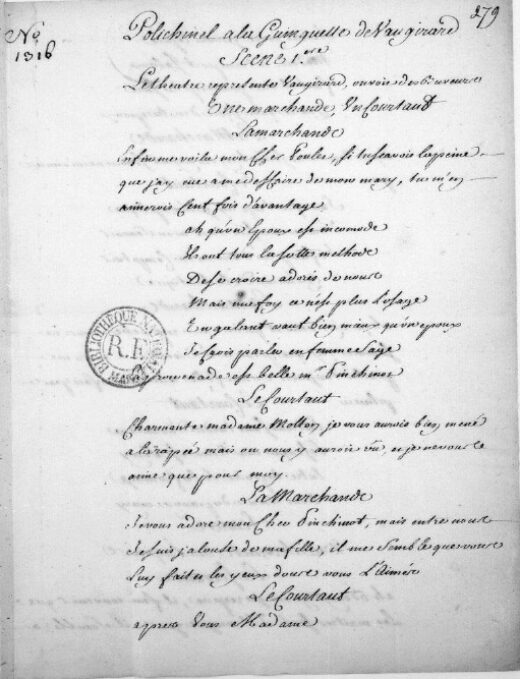
Printed
12 pages
Polichinelle à la guinguette de Vaugirard
This anonymous play, the manuscript of which is kept in the Soleinne collection of the Bibliothèque Nationale de France (French National Library, Ms fr 9312), belongs to a genre of plays called “pièces à tiroirs” (plays with drawers), invented by Molière with Les Fâcheux (1661): these plays feature scenes “coming one after the other but not really following one another, as though each one were taken from a drawer and simply put with the others” (Arthur Pougin, Dictionnaire des théâtres, 1885). As Françoise Rubellin observes, the marquis of Paulmy, an amateur theatre practitioner who used to own the manuscript of Polichinelle à la guinguette de Vaugirard, wrote at the bottom of a page: “to be played with a company of puppets. Needs to be completed with new scenes”.
According to F. Rubellin, the scene between the Laquais (male servant) and the Servante (female servant) was directly inspired by Marivaux’s Jeu de l’amour et du hasard (The Game of Love and Chance), performed for the first time a year before at the Comédie-Italienne.
Conversations about love
A Marchande (female merchant), in love with an employee of the shop (the Courtaud (Shorty)), believes that he is interested in her daughter. A Servante (female servant) arouses the jealousy of a Laquais (male servant). A drunk Musicien (male Musician) tells a Suisse (Swiss man) that his wife is unfaithful to him. Polichinelle tries to seduce a Grisette (Shop girl), meets a Peintre (male painter) who wanted to paint his portrait, and then joins a Troupe de Buveurs (a Group of Drinkers): they dance a divertissement and sing a vaudeville at the end of the play.
First performance
Foire Saint-Laurent, Bienfait's puppets
Publications and translations
Françoise Rubellin (dir.), Marionnettes du XVIIIe siècle, Anthologie de textes rares. Montpellier: Espaces 34, 2022: 137-156.